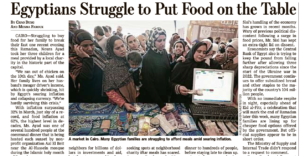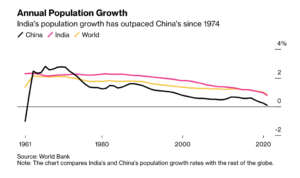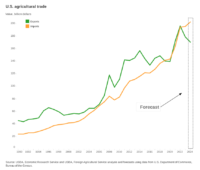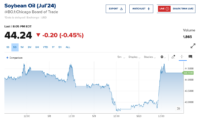Bloomberg's Clarice Couto reported this past Friday that "a surprising tax change in agriculture powerhouse Brazil has the potential to make soy grown in the world’s largest bean exporter less…
Ukrainian Black Sea Grain Exports Are Resuming, India “World’s Most Populous Nation”
Reuters writer Max Hunder reported today that, “Inspections of ships are resuming under a U.N.-brokered agreement on the safe export of grain from Ukrainian Black Sea ports, Ukrainian Deputy Prime Minister Oleksandr Kubrakov said on Wednesday.
2/2 #BSGI: Grateful to the Minister of Defense of Turkey, Akar Hulusi, for the constructive dialogue and clear position on supporting the work of the BSGI. pic.twitter.com/0hWooFNbUo
— Oleksandr Kubrakov (@OlKubrakov) April 19, 2023
“He wrote on Facebook that ‘ship inspections are being resumed, despite the RF’s (Russian Federation’s) attempts to disrupt the agreement.'”
“Agriculture Minister Mykola Solsky said on Wednesday Moscow was increasing difficulties for Ukraine at a time when three eastern European countries have banned imports of Ukrainian grain and food products,” the Reuters article said.
Hunder added that, “Ukraine and Poland reached an agreement on Tuesday to unblock transit of Ukrainian grain from Friday, but the import bans remain in place in Poland, Slovakia and Hungary.”
Reuters writers, Marek Strzelecki and Anna Wlodarczak-semczuk reported yesterday that, “‘We were forced to close the border because the EU had its eyes closed on large amounts of grain flowing into Poland, but at the same time we continued talks with Ukraine on how to enable transits, but with a guarantee grains would not be stuck in Poland, and we managed to find a solution,” [Polish Agriculture Minister Robert Telus] told a news conference in Warsaw.
“Ukrainian First Deputy Prime Minister Yulia Svyrydenko told the news conference she was confident Ukrainian exporters would respect the terms of the deal agreed with Poland.
“It was not immediately clear how the other countries that have imposed import bans on Ukraine would react after the agreement in Warsaw, with Romania looking likely earlier on Tuesday to impose a similar ban.
“Large quantities of Ukrainian grain have been trapped by bottlenecks in eastern and central Europe as low global prices and demand mean grain cannot easily be sold on.”
And a separate Reuters article from yesterday reported that, “Czech farmers have 40% more grains in stock than a year ago as surging Ukrainian exports to European markets have replaced Czech exports, the country’s Agriculture Association said on Tuesday, warning of a potential squeeze in storage capacity.
“The comments by the lobby group are the latest sign of concern in central and eastern European countries about the impact of Ukrainian imports on domestic agriculture markets which prompted Poland, Hungary and Slovakia to ban Ukrainian grain.”
Reuters writer Michelle Nichols reported yesterday that, “Russian Foreign Minister Sergei Lavrov will discuss the Ukraine Black Sea grain export deal with U.N. Secretary-General Antonio Guterres in New York next week, just weeks before the pact could expire unless Russian demands regarding its own exports are met.”
Elsewhere, Bloomberg writers Aine Quinn and Aliaksandr Kudrytski reported today that, “Ukraine’s Black Sea crop shipments resumed on Wednesday, following another brief halt that sparked fresh worries about future cargoes from the key exporter.”
“This week’s Black Sea setback also came as Ukraine’s exports were hit by several European Union neighbors introducing bans on imports of its grain over concerns the supplies are hurting their own markets. Bulgaria on Wednesday followed Poland, Hungary and Slovakia in prohibiting imports,” the Bloomberg article said.
Meanwhile, Reuters writer Pavel Polityuk reported today that, “Ukraine’s grain exports for the 2022/23 season were at 40 million tonnes as of April 19, Agriculture Ministry data showed on Wednesday.
“The ministry gave no exact comparative data for the same date a year ago but said Ukraine had exported 45.5 million tonnes of grain as of April 22, 2022.”

In other news, Chao Deng and Menna Farouk reported in today’s Wall Street Journal (“Egyptians Struggle to Put Food on the Table”) that, “Egypt imports much of its food supply from abroad and has resumed buying wheat from Russia. But a bottleneck in imports, caused by government efforts to conserve foreign currency, has made it harder for domestic companies to buy essential food from abroad, including animal feed.
“Criticism by ordinary Egyptians as well as officials of President Abdel Fattah Al Sisi’s handling of the economy has grown in recent months. Wary of previous political discontent following a surge in food prices, Mr. Sisi has kept an extra-tight lid on dissent.”
And Financial Times writers Joe Leahy and Sun Yu in Beijing and Edward White reported earlier this week that, “China’s gross domestic product expanded 4.5 per cent year on year in the first quarter, as strong growth in exports and infrastructure investment as well as a rebound in retail consumption and property prices drove a recovery in the world’s second-largest economy.
“The official figure, which exceeded analyst expectations of a 4 per cent rise, followed efforts by Chinese leader Xi Jinping’s government to restore business confidence damaged by pandemic controls last year and abrupt policy changes.”

And Bloomberg writers Eltaf Najafizada and Bibhudatta Pradhan reported today that, “India has overtaken China as the world’s most populous nation, according to United Nations data released Wednesday.”
The Bloomberg writers pointed out that, “Asia’s third-largest economy is now home to nearly a fifth of humanity — greater than the entire population of Europe or Africa or the Americas. While this is also true for China for now, that’s expected to change as India’s population is forecast to keep ticking up and touch 1.668 billion by 2050 when China’s population is forecast to contract to about 1.317 billion.”







